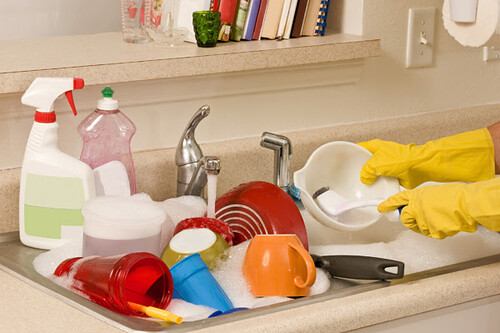Guest Post ~ Bacteria In Your Kitchen

Guest Post ~ Bacteria In Your Kitchen

I change my kitchen towels daily. I do this because I don’t like the look of dirty kitchen towels. I had no idea that they are such carriers for bacteria. Now that I do however I will not ever forget to change out my towels every night. Here is a guest post for you that shows you exactly how kitchen towels are bringing bacteria into your kitchen.


Kitchen Towels Can be a Big Source of Bacteria in Your Kitchen
New study indicates that people should wash and rotate their kitchen towels more frequently.
The kitchen is the heart of the home. You cook, eat and socialize in your kitchen; for many, it is the center of day-to-day living. The kitchen fuels bodies, minds and souls of families across the world, but it can also be the most veritable incubator for bacteria in the household. According to a study published by the University of Mauritius, and presented recently at the annual meeting of the American Society for Microbiology, your kitchen towels may be the leading culprit of pathogen advancement.
“Our study demonstrates that the family composition and hygienic practices in the kitchen affected the microbial load of kitchen towels,” said Dr. Biranjia-Hurdoyal. “We also found that diet, type of use and moist kitchen towels could be very important in promoting the growth of potential pathogens responsible for food poisoning,” she said.
Researchers collected a total of 100 kitchen towels after one month of use. Using standard biochemical tests, they concluded that 49% of the kitchen towels collected in the study had bacterial growth. The bacterial growth increased in number with family size—whether by extended family, or the presence of children.
Experts discourage using kitchen towels for multiple purposes (wiping utensils, drying hands, holding hot utensils, wiping/cleaning surfaces) because they had a higher bacterial count than single-use towels. They also warn against using humid towels because they too showed higher bacterial count than dry ones. Pathogens on kitchen towels would indicate that they could bear some responsibility for cross-contamination in the kitchen and, ultimately, food poisoning. Households with children, older adults or others with immunosuppression should be especially vigilant about hygiene in the kitchen.

Bacteria in Your Kitchen
Your kitchen may be the busiest germ factory in your house, but by stepping up some basic hygiene, you can fight back against germs that tend to lurk around every corner in your kitchen.
Stop Foodborne Illness has 7 tips for keeping your kitchen as germ free as possible:
ᵒ For towels/cloths hanging in the kitchen, allow them to dry after use.
ᵒ Change out towels and cloths at least once a week.
ᵒ Run kitchen towels and dish cloths through the washer at least once per week, using hot water.
ᵒ Dry kitchen towels/cloths on high heat.
ᵒ After washing your hands properly, grab the hand towel, not the dish towel. Better yet, use a single-use paper towel.
ᵒ Clean kitchen surfaces often (at least once a week), using disinfectant sprays or wipes.
ᵒ Don’t get too attached to your sponges. Washing, drying or zapping sponges in the microwave can help reduce germs, but we suggest disposing of sponges at least once a week, or when they smell bad.
Keeping your kitchen germ-free can be challenging, but if your food safety practices include regularly sanitizing your kitchen, you can greatly reduce the risk of getting sick from potentially harmful pathogens. Many of our best memories are made gathered round the kitchen table – a place where everybody feels at home. We want everyone to get comfortable. Everyone, except foodborne pathogens.
About Stop Foodborne Illness
Stop Foodborne Illness is a national nonprofit public health organization dedicated to the prevention of illness and death from foodborne illness by promoting sound food safety policy and best practices, building public awareness, and assisting those impacted by foodborne illness. For more food safety tips please visit http://www.stopfoodborneillness.org/awareness/. If you think you have been sickened from food, contact your local health professional. You may subscribe to receive Stop Foodborne Illness e-Alerts and eNews here: http://www.stopfoodborneillness.org/take-action/sign-up-for-e-alerts/. For questions and personal assistance, please contact Stanley Rutledge, Community Coordinator, at mailto:srutledge@stopfoodborneillness.org or 773-269-6555 x7.
Very informative post, thanks for sharing! This is definitely one area of my house that I am always concerned about the bacteria so I am constantly sanitizing it.
There is so much bacteria lurking around our kitchens. I really try to keep our disinfected. Thank you for sharing this great article